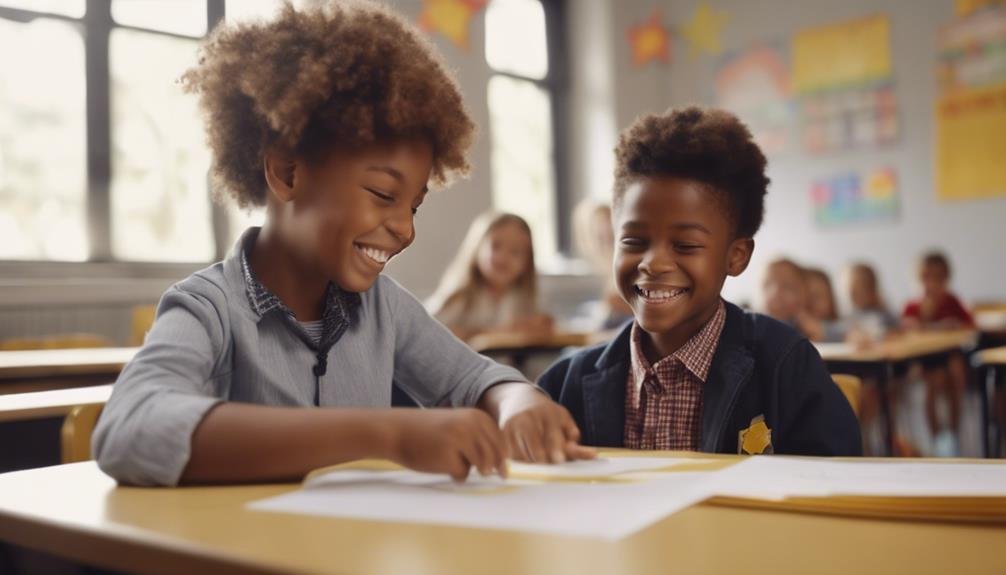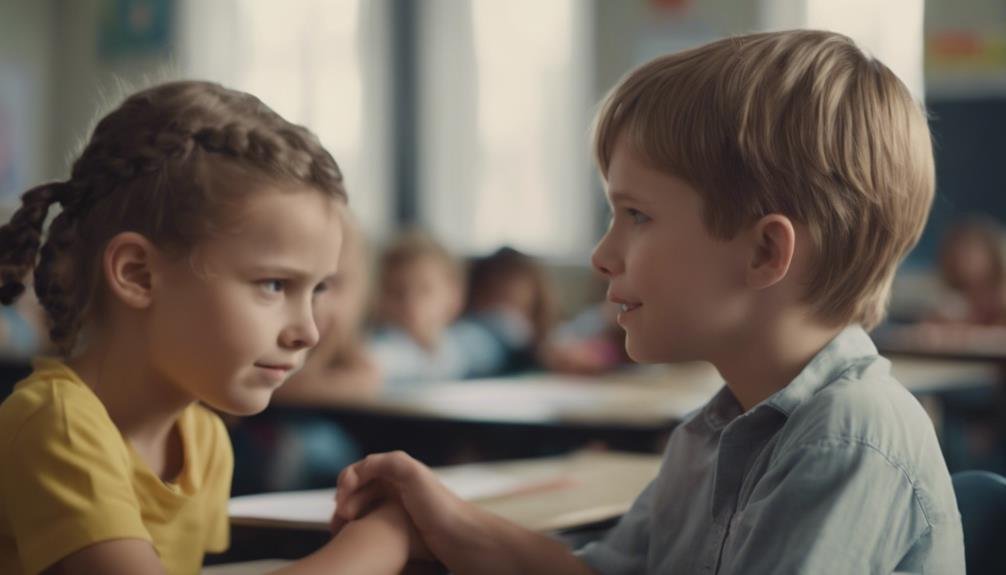"Cherishing Little Steps - A Haven for Baby and Family Journeys"
The Role of Feedback in Child Learning and Development
Have you ever considered how feedback shapes a child's learning journey?
The role of feedback in child development is essential, influencing their growth and progress in numerous ways.
From providing constructive criticism to implementing effective strategies, feedback plays a significant role in shaping a child's educational experience.
Understanding the impact of feedback on children can offer valuable insights into fostering their learning and development.
Key Takeaways
- Feedback is crucial for cognitive growth and critical thinking skills in children.
- Constructive criticism builds confidence by recognizing strengths and areas for improvement.
- Effective feedback strategies enhance self-awareness, motivation, and resilience.
- Feedback plays a pivotal role in shaping children's emotional stability, social skills, and growth trajectory.
Importance of Feedback in Education

In the domain of education, feedback serves as an important catalyst for student growth and learning. Your journey in education isn't just about acquiring knowledge but also about developing a growth mindset. Feedback plays a vital role in shaping this mindset by providing you with insights into your progress and areas for improvement.
When you receive feedback that's constructive and specific, it can motivate you to push beyond your limits and aim for excellence.
Motivational encouragement through feedback can ignite a spark within you, fueling your passion for learning and pushing you to overcome challenges. By acknowledging your efforts and progress, feedback reinforces your belief in your abilities and encourages you to persevere even when faced with difficulties.
Embrace feedback as a tool for your development, as each piece of advice or criticism is an opportunity for growth. Remember, feedback isn't a judgment but a guide to help you reach your full potential.
Types of Feedback for Children
Exploring the various methods of providing feedback to children can greatly impact their learning and development journey. Positive reinforcement plays an important role in nurturing a child's self-esteem and motivation. By acknowledging and praising their efforts and achievements, you can instill a sense of confidence that drives them to excel further. Encouragement through positive feedback creates a supportive environment where children feel valued and encouraged to explore their potential.
On the other hand, corrective guidance is essential for helping children learn from their mistakes and grow. Constructive feedback that points out areas for improvement in a gentle and encouraging manner can guide children towards refining their skills and knowledge. It's important to offer specific suggestions for improvement rather than vague criticism to make that children understand how to progress.
Balancing positive reinforcement with corrective guidance is key to providing effective feedback to children. By creating a nurturing environment that celebrates successes and offers guidance for growth, you can empower children to thrive in their learning and development journey.
Benefits of Constructive Criticism

Utilizing constructive criticism can greatly enhance your child's learning and development by providing targeted guidance for improving skills in a supportive and encouraging manner.
When your child receives constructive criticism, they're given specific feedback on what they can do better, allowing them to understand their areas of improvement and how to work on them effectively.
This type of feedback is instrumental in building confidence as it highlights areas for growth while also acknowledging their current strengths.
Implementing Effective Feedback Strategies
When guiding your child's learning and development, it's important to establish effective feedback strategies that promote growth and understanding. Feedback techniques play a critical role in shaping your child's learning journey. One effective strategy is providing specific feedback that highlights what your child did well and areas where they can improve. This helps your child understand their strengths and weaknesses, fostering a sense of self-awareness that's essential for learning improvement. Additionally, offering feedback in a timely manner is key to reinforcing positive behaviors and addressing areas needing development promptly.
Another valuable technique is the use of constructive feedback that focuses on the process rather than the individual. By emphasizing effort, progress, and strategies used, you encourage your child to see mistakes as opportunities for growth, ultimately boosting their motivation and resilience. Remember, effective feedback is a two-way street; encourage your child to reflect on the feedback received and engage in open discussions to deepen their understanding.
Impact of Feedback on Child Development

Effective feedback plays a pivotal role in shaping a child's development, influencing their learning journey and growth trajectory immensely. When considering the impact of feedback on child development, it's essential to understand its profound effects on various aspects of a child's life.
Here is a deeper look at how feedback influences a child's growth:
- Cognitive Growth: Feedback provides valuable insights into a child's understanding of concepts, fostering intellectual development and critical thinking skills.
- Emotional Well-Being: Constructive feedback boosts a child's confidence and resilience, nurturing a positive self-image and emotional stability.
- Social Skills: Feedback helps children navigate social interactions effectively, promoting empathy, communication, and conflict resolution abilities.
- Self-Esteem: Positive feedback reinforces a child's sense of accomplishment and self-worth, empowering them to tackle challenges with optimism and determination.
Frequently Asked Questions
How Can Parents and Caregivers Provide Feedback to Children in a Way That Promotes Growth and Learning?
When providing feedback to children, remember the power of positive reinforcement and encouragement. By mixing in constructive criticism and fostering a growth mindset, you can guide them towards growth and learning effectively.
What Role Does Self-Assessment Play in the Feedback Process for Children, and How Can It Be Encouraged?
When reflecting on your own progress and setting goals, self-assessment becomes essential in the feedback loop for growth. Encourage self-reflection by prompting questions that spark insight and promote a sense of achievement in achieving personal milestones.
Are There Specific Feedback Techniques That Are More Effective for Children With Learning Disabilities or Special Needs?
When supporting children with learning disabilities or special needs, it's vital to tailor feedback to their individualized strategies. Creating a supportive environment with positive reinforcement and encouragement techniques can enhance their learning experience and boost confidence.
How Can Teachers and Educators Ensure That Feedback Is Personalized and Tailored to Each Child's Individual Needs and Learning Style?
To guarantee feedback is personalized, focus on individualized support and differentiating instruction based on learning preferences. Tailor feedback to each child's unique style. By doing so, you create a nurturing environment for growth and development.
What Are Some Potential Negative Effects of Overly Critical or Unconstructive Feedback on a Child's Self-Esteem and Motivation to Learn?
When feedback is overly critical or unconstructive, it can harm your self-esteem and motivation to learn. Positive reinforcement, constructive criticism, supportive guidance, and fostering a growth mindset are essential for nurturing your confidence and love for learning.
Conclusion
As you navigate the winding road of child learning and development, remember that feedback is your trusted guide.
Just as a compass points you in the right direction, constructive criticism helps children grow and flourish.
Embrace the power of feedback to cultivate a flourishing garden of knowledge and skills within them.
With the right feedback strategies in place, you can watch them bloom into confident, capable individuals ready to take on the world.
Trust in feedback, and watch them thrive.



Dear Parents,
Heavy metal poisoning has become a pandemic among our children: toys and/or clothes from Asia, vaccines or just junk food – the cause is not known, but it does not matter much, the important thing is to quickly and radically eliminate heavy metals from the child’s body!!!
Our multidisciplinary team of proven medical specialists is at your disposal to perform full and adequate chelation, as well as for the complete biochemical recovery of the patient after heavy metal intoxication:
http://www.toxylact.com/clinic/index.html
The price for the internet consultation and the creation of an individual chelation protocol with the issuance of a prescription, including an electronic one, is 150 euros and includes: a comprehensive assessment of your child’s state of health, identification of recovery measures after intoxication and more and more…
We can give you the following instructions in advance:
1. When performing chelation using drugs such as EDTA and the like, never use rapid intravenous infusions, but use the medicinal products as indicated by their manufacturer, i.e. through slow intravenous infusions
2. Do not proceed with the infusion of stem cells against the background of a child’s body intoxicated with heavy metals. Stem cell therapy is great, but in the presence of intoxication, the stem cells will simply be destroyed by the heavy metals quickly and
If our proposal is useful and interesting to you, send us your story via any modern messenger to the phone number below and within 24 hours you will receive our opinion on your individual therapeutic case:
00359884777799
With the confidence that we will be of great use to you, I remain
With respect
Doctor Dimitar Kehaiov